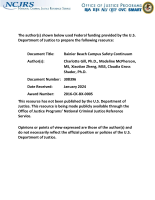Firearm Access, Carriage and Use in an Ethnically Diverse Sample of Young Adults in Texas, USA
Journal
Injury Prevention
Date Published
February 2024
Agencies
NIJ-Sponsored
Publication Type
Research (Applied/Empirical)



